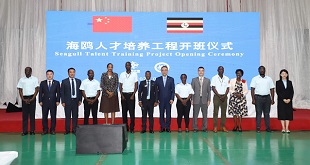Beneficial spending patterns
Yet the government’s spending patterns have been beneficial for companies working in sectors like infrastructure and real estate, which have seen massive investments over the past decade.
Real estate accounted for 51.6% of Centum’s portfolio assets in the last financial year, followed by 36.1% in private equity, 6.2% in marketable securities and 7.6% in development.
Many of Centum’s huge real estate development projects, including Two Rivers in Nairobi and Vipingo on the Kenyan coast, have benefited from road construction by the government or development finance institutions (DFIs).
While Two Rivers Mall is best known as one of Nairobi’s biggest and most modern malls, it sits on 10 acres of the expansive 101 acres development that also boasts a hotel, residential apartments and offices.
Centum began the greenfield project in 2010 as the master developer which included building a water treatment plant able to provide 3m litres of fresh water a day and installing a solar plant with 1MW capacity.
The Kenyan government was able to build the Northern Bypass and, more recently, the Westlands-Redhill Link Road, which act as some of the main arteries feeding into the mall in the south of Nairobi.
At the Vipingo development in Kilifi, Centum has constructed 624 modern houses which will benefit from the African Development Bank’s (AfDB) $345m construction of a road connecting nearby Mombasa with Tanzania.
Over 500 units have been sold in just one year at Vipingo and the Two Rivers is currently running at 80% occupancy, offering handsome returns for shareholders and investors.
Though Nairobi is currently suffering from an oversupply in the housing market which is likely to lower prices and returns, investors should look outside East Africa’s busiest capital city at a wide range of opportunities within the region, Mworia says.
“When people think about real estate – they look at what is happening in Nairobi,” he says.
“But the fact that the housing market is saturated does not mean that demand in other places is not there. In Kilifi and in Entebbe in Uganda we have sold a lot of units.”
Along with private equity investments including stakes in Sidian Bank and Isuzu East Africa, Centum has recently developed its portfolio in two new areas: education and agricultural exports.
In the last two years, Centum has invested considerably in exporting herbs like mint, parsley and tarragon to Europe.
Connecting smallholder farmers to higher value markets is an easy way to increase value, Mworia says.
Centum is also exploring opportunities in the education space, encouraged by the emerging regional trend of a younger population growing at a faster rate, and increasing urbanisation.
In 2018, Centum began the construction of the $20m Sabis International School in Nairobi.
Charging $8,000 a year in tuition fees, Mworia believes the institution will plug the education gap in Nairobi for aspirational parents who are not able to afford some of the more renowned schools which charge up to twice that price.
“We see opportunity at that price point, and even lower, which can still run profitably across the region,” he says.
Investment theory
A business leader who started his career as a filing clerk at Centum in 2001, Mworia describes how within the East African region, consumption-led sectors are the most attractive areas of investment as the demand for local goods and services is domestic.
“We are not an export-orientated economy, we are a local domestic economy,” he says.
“You are selling goods and services where the money ends up in the pockets of ordinary Kenyans as opposed to places like West Africa where you are exporting raw materials and the money ends up in government pockets.”
Kenya itself is fabled for its rapidly growing middle class which guarantees increasing demand and therefore net increases to Centum’s publicly traded securities in real estate, infrastructure, education, banking, transport and consumer goods.
Kenya’s diverse economy, which is not over-reliant on any one sector, is also a key bonus for investors who wish to avoid shocks.
The region was cushioned from the global slowdown which occurred across the rest of globe and in other parts of Africa as a result of the slump in oil prices.
Crowding out
Over the past five years, the main setback to the growth of Kenya’s private sector has been the lack of credit in the market. Though the reasons behind the liquidity crunch are manifold, one significant factor is the government’s propensity to borrow on the domestic market, which has crowded out the private sector.
“The solution is to figure out how the government can stay out of the domestic credit market for at least a year or two,” Mworia says.
“We have a very strong private sector, but the lifeblood of any market is liquidity and investors have flocked to government securities which has left little for domestic businesses.”
While loose monetary policy rates in Europe are causing investors to flock to emerging markets in search of better returns, Mworia believes the government should turn solely to the international markets to satisfy its borrowing needs.
****
 The Independent Uganda: You get the Truth we Pay the Price
The Independent Uganda: You get the Truth we Pay the Price


